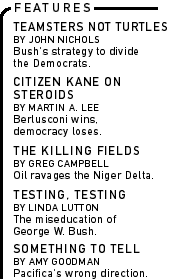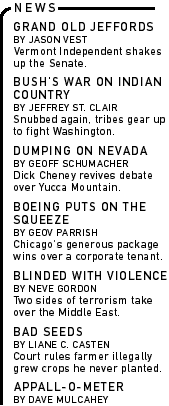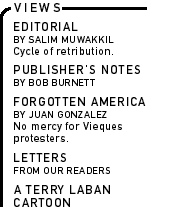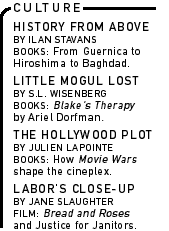

|

|

|

|
|
|
| |
|
|
|
A change of government in Italy is easy to ignore given that it happens so often. But the May 13 ballot won by billionaire media magnate Silvio Berlusconi warrants special attention. His election as prime minister of Italy's 59th government since World War II should trigger alarms in any self-respecting democracy. A flamboyant demagogue with extremist allies, Berlusconi ran as head of a far-right-tilting, populist coalition that embraced openly racist and neofascist parties. The Italian media-mogul-turned-politician compares himself to Napoleon, delights in ridiculing AIDS victims and is chummy with Rupert Murdoch. Convicted four times on charges of perjury, falsifying financial records, tax offenses and bribery, Berlusconi has a shady track record with several criminal indictments still pending. He was voted into high political office despite allegations of Mafia connections and questions about how he acquired his personal fortune. A walking, talking conflict of interest, Berlusconi has his fingers in practically every big-business pie in Italy. He is one of the world's wealthiest men, presiding over a $14 billion financial behemoth that includes Italy's biggest publishing house, its leading advertising agency, its wealthiest department-store chain, a major investment firm, extensive real estate holdings, the country's top soccer club and, most significantly, Italy's three main private television networks. As prime minister, Berlusconi also will control Italy's three public TV stations, thereby commanding the attention of 90 percent of Italy's viewers. Nearly the entire broadcasting system in the world's sixth-largest industrialized economy will effectively rest in one man's hands. "It's a situation without precedent in the Western world," says Giovanni Sartori, professor emeritus of political science at Columbia University and a longtime observer of Italian politics. Likened to "Citizen Kane on steroids," Berlusconi enjoys a concentration of power over information that exists in no other democratic country. Without his domination of the airwaves, he never would have emerged as a significant political figure in Italy. "Sua Emittenza" ("His Transmittance"), as Berlusconi is widely known, marshaled his opinion-molding TV and print venues to demonize his adversaries and further his own political ambitions. Blatantly biased "news" broadcasts on Berlusconi's networks were virtually indistinguishable from campaign ads and press releases hyping his candidacy. During the campaign, Berlusconi was the most visible presence on Italian TV, while his opponents received perfunctory coverage at best. Because Italy's state television doesn't run political commercials, Berlusconi's three national networks exercised a virtual monopoly on election advertisements. His rivals were in the unenviable position of having to shell out money to Berlusconi or forsake TV ads. "This is the only country in the world where the political parties must pay their political adversary in order to run an election campaign," says Giuseppe Giulietti, a parliamentary representative of the Left Democrats, the main party of what is now Italy's center-left opposition. Outspending their rivals by more than 20-to-1 and taking advantage of disproportionate access to national media, Berlusconi's coalition was able to secure absolute majorities in both houses of parliament. His own party, Forza Italia, is the biggest vote-getter in the country. Berlusconi's principal governing partner is Gianfranco Fini, a suave, 49-year-old politician who cut his teeth as leader of the Italian Social Movement (MSI), Europe's oldest neofascist party. Berlusconi publicly aligned himself with Fini before the MSI chief gave his organization a face-lift and renamed it the National Alliance in 1995. The National Alliance recently grabbed 11 percent of the vote, ensuring that Fini will be deputy prime minister in the new regime. Fini claims that he is now a mainstream conservative, but the identity of his party remains inextricably bound up in its fascist heritage. Despite Fini's attempts to distance himself from the most extreme elements of the National Alliance, many of its members still harbor nostalgia for Mussolini's Blackshirts. Francesco Storace, Fini's close associate and National Alliance president of the Lazio region, wants to rewrite school textbooks, which he says give a Leninist slant on Italian history. Forza Italia also made an electoral pact in Sicily with Fiamma Tricolore (Tricolor Flame), an unapologetically fascist sect. Popular among skinheads and neo-Nazis, Fiamma Tricolore is led by Pino Rauti, a veteran of the terrorist underground. Four members of Ordine Nuovo (New Order), a neofascist group formed by Rauti, are currently on trial for a 1969 bomb attack in Milan that killed 16 people and injured 84 others. And then there's Umberto Bossi, head of the xenophobic Northern League, which holds the balance of power for the ruling coalition in Italy's lower house of parliament, even though it polled only 4 percent of the vote. Bossi's crude and incessant immigrant-baiting has drawn comparisons with Austrian far-right leader Jšrg Haider, who was among the first to congratulate Berlusconi for his electoral triumph. Bossi has called for the Italian navy to shoot at ships suspected of carrying undocumented immigrants into the country. Strident anti-immigrant rhetoric was also a staple of Berlusconi's campaign, while his TV stations stoked public anxiety by depicting Italy as a nation overrun by foreign criminals. Not surprisingly, the six criminal cases still pending against Berlusconi haven't gotten much coverage on his networks. If his legal wrangles are discussed at all on privately owned Italian television, it is to provide an opportunity for Berlusconi to lash out at his detractors. He claims that all such charges are Communist-inspired slander. In the world according to Berlusconi, "Communists eat babies" (his own words), and a conspiracy of left-wing magistrates is hell-bent on undermining his mandate to save Italy. Portraying himself as an outsider who defeated the business establishment, Berlusconi says he'll run the country as "Italy Inc."--applying the same energy and skills that made him a successful entrepreneur. The myth of the self-made man is central to Berlusconi's mystique, but there is no such thing as a self-made billionaire, especially in a country like Italy. A former nightclub crooner on Mediterranean cruise ships, Berlusconi built his business empire not by bucking the establishment, but by paying it off. Although he fashioned an image of himself as a maverick newcomer untainted by the corrupt old guard of Italian governance, he owes much of his success to a shadowy network of economic and political power brokers. In the late '70s, Berlusconi secretly joined Propaganda Due (P-2), an elite, fascist-leaning masonic lodge that is often mentioned in accounts of Italian intrigue. Described by Italian judges as an illegal "state within a state," the P-2 had high-level connections to Italian intelligence agencies, the armed forces, leading financiers and captains of industry. P-2 members have been implicated in nearly every major political scandal that has shaken Italy since the mid-'60s--including neofascist bombings, coup plots and a major smuggling operation that specialized in arms and drugs, while laundering dirty cash through front companies owned by the Vatican Bank. Berlusconi's name was found on a list of P-2 initiates after a 1981 police raid in Tuscany. Of the 963 names on the P-2 roster, most were prominent Italians. The list also featured several dubious characters from Argentina, including: Gen. Juan Peron, the former president; Jose Lopez Rega, head of the Argentine Anti-Communist Alliance, a notorious death squad; and Adm. Emilio Massera, a member of the military junta responsible for the disappearance of 30,000 people during the "dirty war" of the '70s and early '80s. Convicted of making false statements about his P-2 membership, Berlusconi managed to escape unscathed from the scandal thanks largely to Socialist Party chief Bettino Craxi, who became Italy's prime minister in the mid-'80s. Craxi was the best man at Berlusconi's second wedding, and both men were adept at exploiting the lucrative system of political patronage and illicit pay-offs that flourished in postwar Italy. Craxi was instrumental in thwarting early attempts to rein in Berlusconi's media outlets, and Berlusconi, in turn, actively promoted Craxi on his TV stations. During this period, Craxi and other right-wing political leaders in Italy knew they could count on unflinching support from Washington, which propped up a political order that was riddled with corruption in an all-out effort to keep the sizable Italian Communist Party from gaining power. But when the Cold War ended, so did the Communist threat, and the entire political edifice in Italy crumbled overnight. Hundreds of public officials were arrested in the early '90s as the result of a "clean hands" campaign by Italian magistrates who uncovered massive corruption and Mafia influence within the mainstream parties. Craxi fled to Tunisia to avoid a prison sentence. Prosecutors in Milan subsequently traced $6 million that had been funneled from Berlusconi's Finnivest company to foreign bank accounts controlled by Craxi, who died in exile last year. Staving off a series of legal challenges, Berlusconi surged forward at a propitious moment to fill the void created by the precipitous demise of the two leading mainstream right-wing forces in Italy, the Christian Democrats and the Socialists. Suddenly bereft of party protection, which had always been crucial to his commercial success, Berlusconi needed to enter the political arena directly. So he founded Forza Italia, which governed briefly in 1994 before giving way to six-and-a-half years of lackluster, center-left rule. The political bankruptcy of the center-left coalition is partly to blame for Berlusconi's comeback. Rather than passing tough antitrust measures to break up Berlusconi's media assets, the center-left government focused its attention on imposing major cuts in social welfare programs and stringent economic prescriptions required by the European Union. Meanwhile, unemployment remained at chronically high levels. With dissatisfaction palpable at the grassroots, the "Olive Tree" alliance, as the center-left was called, sought to keep open the possibility of including Berlusconi's party in a "national unity" government, should the need arise. Nobel Prize-winning dramatist Dario Fo bemoans the short-sighted
strategy of the Olive Tree coalition, which miscalculated when it
assumed that Berlusconi's tangled web of companies and his checkered
past would render him politically vulnerable. "In a thoroughly slavish
manner," Fo says, "the left kept Berlusconi in the game, because
they believed this was the best way to improve their prospects.
This is the only reason that things have advanced as far as they
have." Those who underestimated Berlusconi will pay a steep price.
Martin A. Lee is the author of Acid Dreams and The Beast Reawakens, a book on neofascism
|

